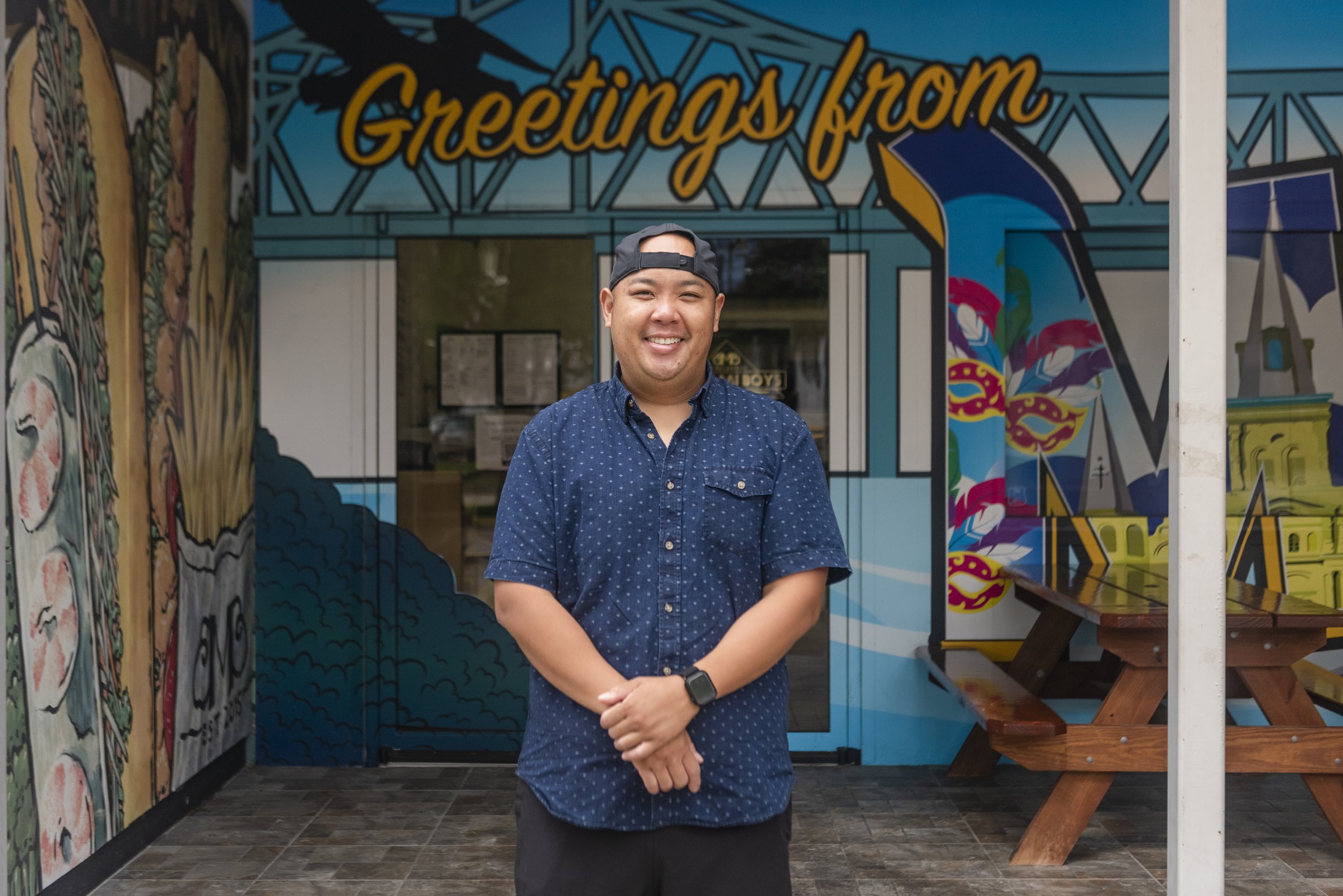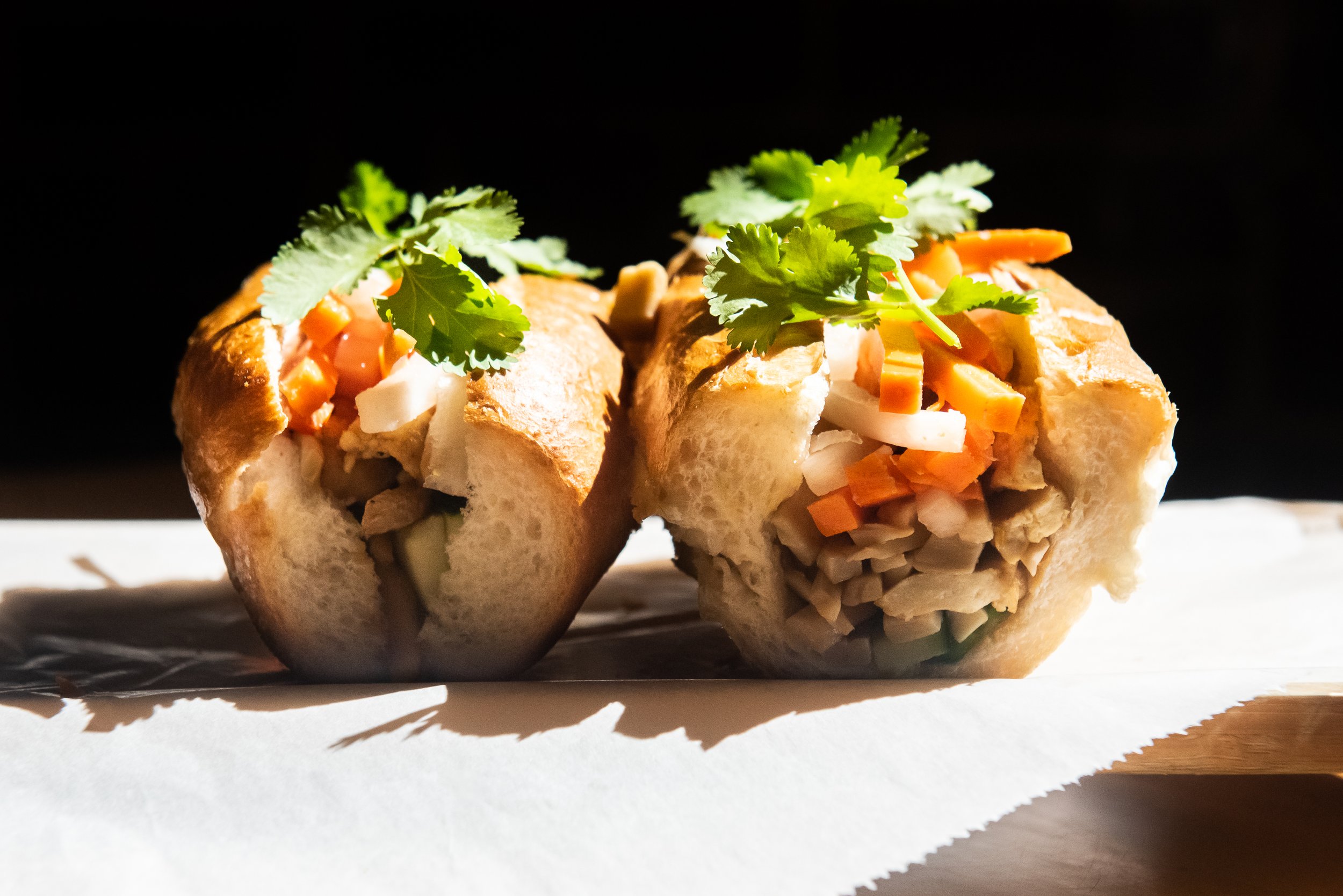Fueling Bánh Mì Boys
Restaurateur Peter Nguyen shares how he evolved his family business
by combining his Vietnamese heritage with New Orleans culture.
Peter Nguyen always knew he wanted to be a business owner. He learned from the best: his parents have owned a successful gas station and convenience store in Metairie for over 20 years. When his family acquired the empty lot next door, Nguyen saw it as a chance to launch a fast casual concept—something that incorporated his Vietnamese upbringing. So with his parents' blessing, Nguyen launched Banh Mi Boys, serving Vietnamese-inspired sandwiches, classic po’ boys, and everything in between.
Peter Nguyen of Bánh mì Boys | Photos: Will Blunt
Spicy Asian BBQ Brisket Bánh mì
Amelia Schwartz: How did your family end up owning the gas station in Metairie?
Peter Nguyen: The whole business was my father. He landed a job at a local oil company in Louisiana. It was to basically just work at a gas station—the company was buying gas stations to sell oil and needed someone to run the convenience store. They asked him how much do you wanna get paid and he told them, “I'm not worried about that. Y’all decide what y’all pay me after y’all give me work.” That was his work hustle. He became real good friends with the owner and then they worked together on [operating gas station convenience stores] multiple times over to the point where he ended up owning his own gas station.
AS: So growing up, you helped your parents run the gas station. What was that like?
PN: It wasn’t fun! Because that was my life pretty much. And I was eating a lot of junk food at that gas station. But it was cool to understand the business. Like I said, we went to school, and that was our lives—helping out the family. [I learned a lot from] their work ethic. As I was growing up, it was my parents always working, and it was me and my three other older brothers at the house by ourselves, kind of taking care of ourselves, and they would come home at the end of the night. That's the typical life of Asian immigrants—working all the time.
Bang Bang Shrimp Banh Mi
Cajun Crack Fries
AS: What made you want to start your own business?
PN: I always had a passion for cooking and I would grow up watching the Food Network, Cooking Channel, PBS cooking shows, and all that stuff. I’ve always had a very curious mind, so I was so excited to see all the different cuisines they were cooking because I love to learn new things. That's what gave me the passion to cook. And I always wanted to be in business because that's all I really knew—what my parents were trying to teach me; little things here and there about owning a business. They always embedded in me that that was the route to go, but they still wanted me to go to school. So I got my degree in business marketing. All of that ties into what I've integrated into my life today.
AS: And how did that idea of owning and operating a food business develop into Banh Mi Boys?
PN: So originally the spot [next to the Metairie gas station] was supposed to be just a po’ boy spot—that was my parents' idea. They wanted to do a po’ boy shop because there was a po’ boy shop across the street and they wanted to just take the overflow of their business. But I told them, let’s integrate our culture into this and make something that has longevity because there are so many po’ boy shops in the city and there aren't too many people specializing in banh mi. I let them know that this was the opportunity to provide something different to the city or something new and exciting. And at the time, about six years ago, the state of Vietnamese food [in New Orleans] was just the knowledge of pho. I really wanted to shine light on something that not a lot of people knew about. So I took that concept and I wanted to, you know, make it new and exciting. It was a battle. It took a long time because [my parents] were scared of failure.
peter Nguyen of Banh Mi Boys
Pho CHICKEN Wings:
AS: How did your parents come to understand and value your concept idea and trust you as a business owner?
PN: So in the beginning, I was there as a helper because I was the only one that really knew how to cook. I had to break my way in somehow, so I added these two items, which were the steak and eggs banh mi—Bo Ne banh mi—it's [traditionally] a Vietnamese breakfast plate with baked egg, pâté, butter, hotdog, and it would come with a baguette. So I converted that to an actual sandwich and also doing a loaded fries version along with the Oysters Rockefeller po’ boy and Oysters Rockefeller fries. [My parents] were already familiar with [bo ne and Oysters Rockefeller], so that's really what got us on the right foot.
A lot of people were paying attention and seeing that we had these new foods, and people were coming in the door to try [them], along with traditional foods like regular po’ boys, regular banh mis, and wings. But then we kind of bumped heads a little bit off-on, because my mom takes a lot of pride in her cooking too. So I gave [my parents] the option: look, you can run the shop or you can have me take over, so we don't have to argue about who has control of this menu. So they said, “We’re gonna give you a key. You pay the bills. If you can make it, make the place survive, then you can have control. So they really put me to the test. They left everything to me to figure out. We just kept going to the point where they fully trusted me. And then they gave me the whole business. They own the building, so I just pay them whatever they want to charge me for rent.
AS: What’s your dream for the future of Banh Mi Boys?
PN: I wanted to introduce not just Vietnamese, but try my best to infuse other cuisines. Because with New Orleans food and with Vietnamese food, those [cuisines] are based off of two cultures combining together. So it only makes sense for me to keep that going. Because that's the only way you can innovate, to change things up. You gotta think outside the box and give something to the community that they can get excited about. We’ve got a long history of this food, but we gotta create new history.









